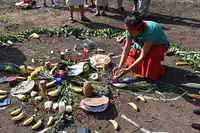First Meeting of Women Defenders of the Territory and the City, Mexico
The International Alliance of Inhabitants convened the First Meeting of Women Defenders of the Territory and the City, in Actopan, Mexico, involving 103 women from Puebla, Mexico City, Oaxaca, Veracruz and Ecuador.
The meeting flourished with dialogue, exchange of experiences, and testimonies.
It is urgent to concretize, conserve, mobilize, and strengthen the unity of the R-existences, offer solidarity, promote capacity building, promote initiatives that allow wellbeing, live in full harmony with nature, denounce dispossessions and repression, take advantage of the potential in social networks to visualize the role of women, build broad alliances, participate in national and international events to defend the territory, our territories, because life will only be possible with the participation of women.
In Latin America, women have played an important role in defending the territory in the countryside and in the city. Concerned about the differential impact on men and women of neoliberal policies that are promoted for the benefit of capital, women organize themselves to make their role visible in different R-existences and demand their participation in decision-making. This is fundamental in movements that by their courageous R-existence have overcome the installation of diverse megaprojects but particularly by the extractive and dispossession policies imposed by the capitalist model.
In this context, the International Alliance of Inhabitants convened the First Meeting of Women Defenders of the Territory and the City, in Actopan, Mexico, involving 103 women from Puebla, Mexico City, Oaxaca, Veracruz and Ecuador.
For two days, with the full spring that shone brightly on the banks of the Farallon Laguna, amidst colorful flowers, the warm sea breeze, the local cuisine cooked by the men, the women debated with freedom. Joyful and combative, they analyzed the reality that is lived in their communities and showed that the onslaught of the current capitalist model does not give way, on the contrary every time it gets worse, putting at risk the life of the communities and their biocultural environment.
The meeting flourished with dialogue, exchange of experiences, and testimonies. We discovered the strengthening factors of woman’s nature that have to do with spirituality, education, sensibility, what each person feels and how they act. A very important aspect of women is the ability to be brave: in spite of being afraid, they have the courage to face problems, they have the strength to stop what they feel is wrong: extractivism, highways, housing complexes, and dispossession.
We give life, we are caretakers, we breastfeed, we have intense agricultural labor; we women have a capacity to understand ourselves as we are, to fight for what is inside of us, to back eachother up, to share knowledge, to foster empathy among us, and even to disagree without tainting the personal relationship. Ideas are ideas, what is important is coexistence. The important thing is to join together, men and women. In this country (Mexico), the installation of hydroelectric plants, toxic mining, gas pipelines, and monocultures has been stopped. We believe that it is necessary to persevere--and women have that quality, we are committed to persevere so that the world favors everyone, not only the powerful. "To understand the territory: what each one understands as territory, each one of us is territory...each one of us is --we do not have --we are territory."
We conclude that it is urgent to concretize, conserve, mobilize, and strengthen the unity of the R-existences, offer solidarity, promote capacity building, promote initiatives that allow wellbeing, live in full harmony with nature, denounce dispossessions and repression, take advantage of the potential in social networks to visualize the role of women, build broad alliances, participate in national and international events to defend the territory, our territories, because life will only be possible with the participation of women.
The Volunteer translator for housing rights without frontiers of IAI who has collaborated on the translation of this text was:




